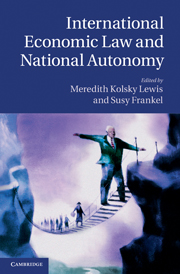Book contents
- Frontmatter
- Contents
- Notes on contributors
- Acknowledgements
- Introduction
- PART I International economic law: conceptions of convergence and divergence
- PART II WTO treaty interpretation: implications and consequences
- 4 Demanding perfection: private food standards and the SPS Agreement
- 5 Eroding national autonomy from the TRIPS Agreement
- 6 The WTO and RTAs: a ‘bottom-up’ interpretation of RTAs' autonomy over WTO law
- 7 ‘Gambling’ with sovereignty: complying with international obligations or upholding national autonomy
- PART III Responding to international economic law commitments
- PART IV Transformations in international economic law
- Index
- References
7 - ‘Gambling’ with sovereignty: complying with international obligations or upholding national autonomy
from PART II - WTO treaty interpretation: implications and consequences
Published online by Cambridge University Press: 10 January 2011
- Frontmatter
- Contents
- Notes on contributors
- Acknowledgements
- Introduction
- PART I International economic law: conceptions of convergence and divergence
- PART II WTO treaty interpretation: implications and consequences
- 4 Demanding perfection: private food standards and the SPS Agreement
- 5 Eroding national autonomy from the TRIPS Agreement
- 6 The WTO and RTAs: a ‘bottom-up’ interpretation of RTAs' autonomy over WTO law
- 7 ‘Gambling’ with sovereignty: complying with international obligations or upholding national autonomy
- PART III Responding to international economic law commitments
- PART IV Transformations in international economic law
- Index
- References
Summary
Introduction
A significant number of prominent WTO disputes, including EC – Hormones, US – Shrimp and US – Foreign Sales Corporations, have raised questions over state sovereignty in exercising control over important matters. Both anti-globalisation advocates and hard-core free traders often blame the WTO dispute settlement system for allowing its actors, especially the WTO Appellate Body, to allegedly go beyond their mandate and create new rules rather than applying existing ones. The US – Gambling dispute between the tiny Caribbean island nation of Antigua and Barbuda (Antigua) and the United States involved sovereignty-related issues over the extent the WTO judiciary may ‘interfere’ with US perceptions of public order and morality. However, this dispute points to further aspects affecting national autonomy and the reach of international obligations, which are this chapter's focus. The continued US failure to comply with the recommendations and rulings of the Dispute Settlement Body (DSB) has led to arbitration over Antigua's right to retaliate by suspending its obligations under the TRIPS Agreement in order to induce compliance. Rather than discussing the technical details of cross-retaliation, I focus on the sovereignty aspects this type of retaliation raises. To what extent can the WTO dispute settlement system provide trade heavyweights and small economies with an effective mechanism to enforce international obligations under WTO law? Does the notion of suspending intellectual property (IP) protection give developing countries an effective tool, given the economic importance IP has for most industrialised economies?
- Type
- Chapter
- Information
- International Economic Law and National Autonomy , pp. 141 - 166Publisher: Cambridge University PressPrint publication year: 2010
References
- 1
- Cited by



